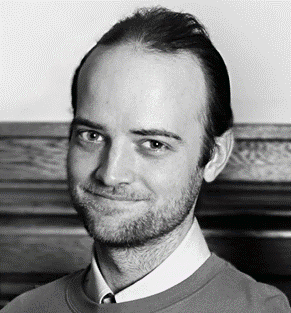In Memoriam: James Parker

In Memoriam: James Parker
Beloved instructor, mentor, and friend in the department
Not many Minnesotans can say they lived in Italy, but James Parker could. The University of Minnesota lecturer and alumnus with multiple degrees from the College of Science and Engineering spent the spring of 2014 in Verona. He left that trip not only with a deeper understanding of another country and its people, but with a broader knowledge of multi-agent systems in artificial intelligence (AI)—his field of interest and specialty.
James, age 37, passed away suddenly and unexpectedly on January 20 from diabetic ketoacidosis, an acute and deadly medical condition that quickly developed because he had undiagnosed adult-onset Type 1 diabetes. A celebration of James’ life is Saturday, Feb. 12, 2022, at the Willwersheid Funeral Home, 1167 Grand Ave., St Paul, Minn. Visitation will begin at 2 p.m., followed by memories and stories of him at 3:30 p.m.
The department is planning an in-person memorial service when University Covid-19 restrictions allow. Details will be sent to faculty, staff, students, and alumni.
“What I remember most about him was his attitude—James was very modest, respectful, hardworking, and supportive,” said Maria Gini, professor of computer science and engineering. “He was a Midwest kid with solid values, and I saw all of his good qualities when I was his Ph.D. advisor.”
Under her supervision, Parker worked on a number of research papers and projects related to AI and robotics—specifically the areas of search and rescue applications—individually and in groups, with other doctoral candidates, post-docs, and undergraduate student researchers.
James’ 2017 thesis entitled “Task Allocation with Growing Costs” examined what happens when the tasks given to an agent (anything that can autonomously perceive its environment and interact with other agents or humans) increase their cost or change over time. For example, is it better for a computer-controlled program to send an ambulance and a firetruck to one collapsed building during an earthquake or to send that firetruck, along with four other firetrucks, to extinguish multiple raging fires across town? In his thesis, James offered a solution for when agents can only be assigned once. He also proposed a model and an algorithm for different agents and changing tasks to better interact.
A year later, in 2018, he published the National Science Foundation-funded research he had conducted in northern Italy titled “Lazy max-sum for allocation of tasks with growing costs,” in collaboration with Gini and University of Verona AI expert Alessandro Farinelli, appeared in the international journal Robotics and Autonomous Systems.
A gracious and generous mentor
After graduating from Edina High School, James went on to earn a double major—B.S. in mathematics and B.S. in computer science, summa cum laude—at the University of Minnesota in 2007. He continued his studies on the Twin Cities campus, receiving an M.S. and Ph.D. in computer science in 2015 and 2017, respectively.
While a graduate student at the U, James also taught undergraduate courses in the Department of Computer Science & Engineering. Among them, CSci 4511W: Introduction to Artificial Intelligence and CSCI 4041: Algorithms and Data Structures. His talents and passion for teaching were evident. He consistently supported students through classroom, independent study, and directed research learning options.
The adjectives “kind” and “patient” appeared frequently in his student evaluations of his teaching. In fall 2015, he was hired as a lecturer in the Department of Computer Science & Engineering—and served in that role on the Twin Cities campus until his death.
“He was gracious and generous with his time,” said former student Po Tin Mak. “I first met him in 2016 when I took his intro to C++ class. It was a required course, and I found the material very hard because I had no prior experience to programming. But James had office hours—and I went to it a lot. So did other students. He always was patient with us, clarifying concepts and explaining things, some times over and over, to all of us who visited him until we each got it.”
Mak maintained their professional connection after earning her mechanical engineering degree in May 2019.
“James made such an impact on me when I didn’t know anything about computer programming,” said Mak, who now holds an associate-level position with Amazon’s investigation and loss prevention team in London. “I decided to contact him again after I graduated because I needed advice on learning more programming on my own and on how I could pursue a career in software engineering in my current company or another place.”
The two last connected via Zoom in mid December 2021. A follow-up meeting was scheduled in January.
“Unfortunately, I didn’t get a chance to connect with him again,” Mak noted. “Since I left Minnesota, James has helped me improve my technical skills and brush up my résumé. There is no way I could have gotten any interviews with programming in the title or job description without him. James has been my biggest supporter and friend in the tech field—and when I finally get a job offer in software engineering, I will accept it in his honor.”
-------------------
The James Parker Scholarship
The Department of Computer Science & Engineering is working with James Parker’s family to establish a scholarship in his name. The scholarship will support students with financial need studying computer science. Gifts can be made via the University of Minnesota at z.umn.edu/JamesParkerMemorialScholarship. (When submitting the form, please state that your gift is in his memory.)
--------
Read more
His paper “Lazy max-sum for allocation of tasks with growing costs,” co-published in Robotics and Autonomous Systems, is accessible on Experts@Minnesota.